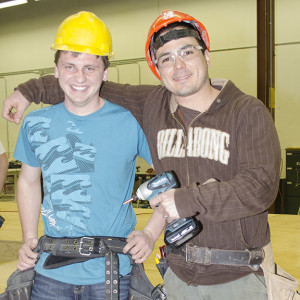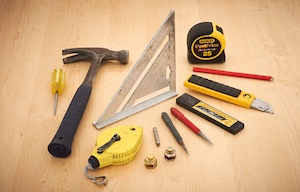Frequently Asked Questions
Learn the answers to the most frequently asked questions for the Carpentry and Renovation Techniques Program.
I’m not sure if a career in the trades and taking this program is what I really want.
You are not alone! Making a career decision can be challenging. Our Carpentry and Renovation Techniques program is an ideal way to gain comfort and confidence with skills and techniques associated with a variety of carpentry trades. Whether you decide to pursue an apprenticeship path after you complete this program, or transition into employment within a trades-related business, the skills you acquire will benefit you in your future career path and personal life.
How long is this certificate program?
A one-year Ontario College Certificate program is completed in eight months of studies. That means that you will start your studies in September and complete your two semesters at the end of April.
Is the program all “hands-on”?
The answer is both yes and no! Despite this common misconception for trades training, this program has a balance of theory and practical courses. Lectures, note-taking, math, communications skills, drafting, research and report writing comprise a significant part of the program. The “hands-on” activities are designed to provide students with an opportunity to put the “theory” into practice. Successful students spend at least as much time completing assignments for their theory-based courses as on their practical projects.
Is there a lot of homework?
Yes. To be successful, a typical student will need to do one hour of homework for every hour of theory class. So, on average, a student must be prepared to spend a minimum of 5 – 10 hours per week on homework. Quizzes, tests, term papers, group projects and final exams are part of the evaluation scheme for most courses.
Are there scholarships available for this program?
Yes, there is the Weston Family Scholarship in the Skilled Trades. The W. Garfield Weston Foundation has a long history of supporting excellence in education – one that increases the recruitment, retention and employability of post-secondary students and apprentices who are beginning their careers in the skilled trades. For over 60 years the Foundation continues to collaborate with a broad range of Canadian organizations to further world-class research, explore new ideas, and create tangible benefits for the communities in which it works. Algonquin College is proud to receive support from The W. Garfield Weston Foundation to recognize students in skilled trade/apprenticeship programs for programs such as our Carpentry and Renovation Techniques program.


Do I need to have previous carpentry experience?
No. The program is organized to challenge and meet the learning requirements for students with a wide range of backgrounds, from those with little or no experience in the trades to individuals with time on the job, but who lack the theoretical background needed to excel in the trade. No doubt, it helps to have some basic carpentry skills, but, more importantly, is a strong desire to work in the trades, a solid foundation in math and communications. Construction carpentry is considered to be physically demanding.
What is the shop like where we get to build and learn?
The Carpentry and Renovation Techniques students have the opportunity to work in a 10,000 square foot Shop that is dedicated to them and designed to support their learning. The Shop is equipped with quality tools and equipment to allow students to work independently or within a group. It is important to note that the Shop is not on campus, but off-site approximately three kilometres from the College on Blakely Crescent. Students are required to arrange their own transportation to and from the Shop on a regular basis.
Do I have to be in good shape to take this program?
If you are looking to enter the trades, you will be on your feet all day, lifting and moving lumber and materials around, climbing ladders, sweeping and shovelling. Plain and simple, construction trades can be hard work so it helps to be in shape. To fully participate in all aspects of the trade, you need to be committed to being in shape and conscious of your health.
Do I need to have any tools for this program?
Yes. Below is a guideline for the tools and the estimated costs of the tools you will need. All registered students also receive approximately $250 worth of tools from the college! The recommendations are for brands and types we know to work well and are of good quality. A good tool will last your lifetime, expect to spend accordingly.
|
Tools That the College Gives to You |
Cost |
| 2 Tape Measures – Stanley (16’ & 25’) | $24.99 |
| 2 Speed Squares – Stanley (7” & 12”) | $15.99 |
| 16oz Finishing Hammer – Stanley (straight claw) | $36.99 |
| Nail Set – Stanley | $15.99 |
| Utility Knife – OLFA | $8.99 |
| Handsaw – Stanley (12tpi finishing saw) | $36.99 |
| Wood Chisel Set – Stanley (Set of 3) | $37.99 |
| Carpenters Apron – Kuny’s | $33.99 |
| Block Plane – Stanley (7”) | $43.99 |
| TOTAL | $255.91 + tax |
| Tools That You Are Required to Purchase | Estimated Cost |
| Steel Toed Safety Boots | $40 – $260 |
| Safety Glasses | $2 – $30 |
| Hard Hat (any colour – make sure it doesn’t fall off when you look down) | $20 – $50 |
|
Optional Additional Tools You Can Purchase |
Estimated Cost |
| Framing Hammer | $35 – $250 |
| Chalk Line | $10 – $20 |
| Cat’s Paw (10” claw) | $10 – $30 |
| Hearing protection | $1 – $60 |
| ¼” chisel | $5 – $20 |
If you are unsure of what to buy please do not buy anything until you arrive at college. We can help.